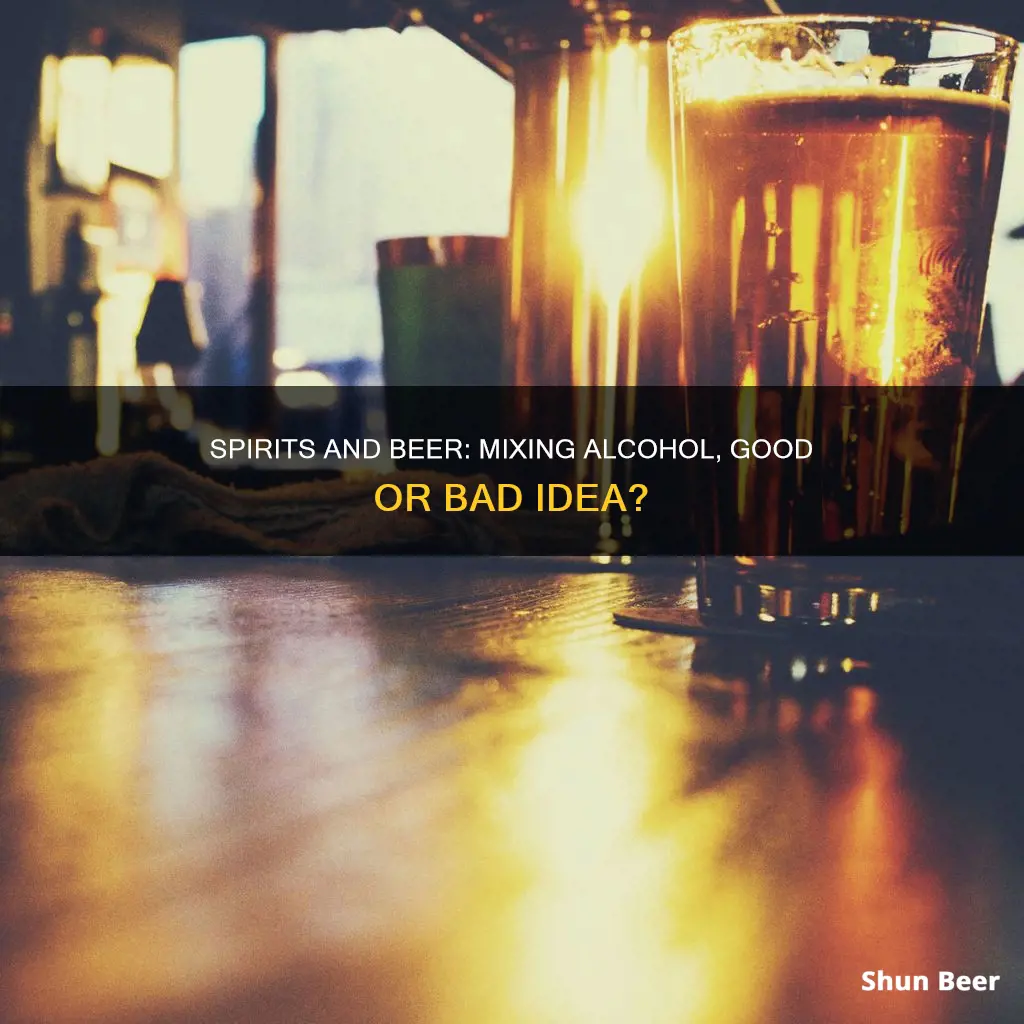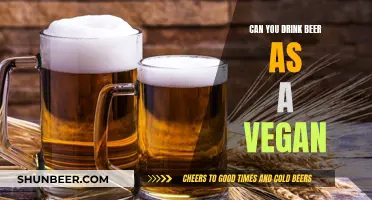
Beer before liquor, never been sicker; liquor before beer, you're in the clear is a well-known phrase among drinkers, but is there any truth to it? The short answer is no. It is not the order in which you drink that will make you sick, but rather the amount you drink. While there are many theories about how this saying originated, most explanations appear to be based on people's subjective experiences of drinking and hangovers.
| Characteristics | Values |
|---|---|
| Whether drinking order affects hangover | No |
| Why the "beer before liquor" myth exists | Carbonated drinks irritate the stomach lining, increasing alcohol absorption rate. People tend to drink less beer after liquor. |
| What really matters for hangover prevention | How much you drink, whether you ate, how frequently you drink, genetics, congeners, smoking |
| How to avoid a hangover | Drink water, pace yourself, eat before drinking, avoid drinking on an empty stomach, don't smoke |
What You'll Learn

The amount of alcohol you drink matters more than the order
The popular saying, "beer before liquor, never been sicker; liquor before beer, you're in the clear," has been debunked by experts. The order in which you consume alcoholic beverages has little to no impact on the severity of a hangover. Instead, it is the total amount of alcohol consumed and other factors that determine the likelihood and intensity of a hangover.
The amount of alcohol consumed is the most critical factor in determining the likelihood of experiencing a hangover. High blood alcohol levels are more likely to induce a hangover than low blood alcohol levels. The volume of a drink is, therefore, a more important consideration than its alcohol by volume (ABV) percentage. For example, a Manhattan cocktail (28% ABV) and a bottle of beer (5-6% ABV) cannot be directly compared based on their ABV since the amounts consumed are typically different. The bottle of beer has a much larger volume, and it would take approximately 2.5 Manhattans to equal the volume of one beer. Thus, the beer would provide a lower alcohol per minute rate of consumption compared to the cocktail.
Another factor to consider is how well the body absorbs alcohol in different preparations. A 2007 study found that vodka served diluted with carbonated or still water was absorbed faster than vodka served neat. This means that even if the same amount of time is taken to consume straight liquor or a glass of wine (which contain similar amounts of absolute alcohol), the wine will result in higher intoxication levels due to better absorption into the bloodstream.
Additionally, drinking on an empty stomach can lead to faster intoxication and more severe hangovers. Food in the system slows the absorption of alcohol and can minimize sickness. Other factors that can influence hangover severity include genetics, frequency of drinking, congeners (compounds found in alcoholic beverages), and smoking.
While the order of consumption may not significantly affect hangovers, there is some merit to the idea of starting with lower-ABV drinks and progressing to higher-ABV drinks throughout the evening. By starting with lower-ABV drinks, individuals can better pace themselves and evaluate their level of intoxication as the night progresses. However, this strategy is not foolproof, and the most important factor remains the total amount of alcohol consumed.
Beer and Heart Health: Can It Cause Irregular Heartbeat?
You may want to see also

Carbonation may increase alcohol absorption
Carbonated alcoholic drinks can increase the rate of alcohol absorption. The pressure inside the stomach and small intestine forces alcohol to be absorbed more quickly into the bloodstream. In a study, 14 out of 21 subjects absorbed alcohol with a carbonated mixer faster, while 7 subjects showed either no change or a decrease in the absorption rate.
The idea that carbonation increases alcohol absorption stems from the irritation of the stomach lining caused by carbonated drinks like beer and sparkling wine. This irritation increases the rate of alcohol absorption. However, it is important to note that the effect of carbonation on alcohol absorption is temporary, and it may not significantly impact the likelihood of a hangover.
The absorption of alcohol occurs primarily in the small intestine, where absorption is faster due to a large absorptive surface area and extensive blood supply. The pyloric valve, which separates the stomach from the small intestine, closes when food is present, especially protein and fatty foods. This keeps alcohol from entering the small intestine, slowing down the rate of intoxication.
The rate of alcohol absorption also varies among individuals and is influenced by factors such as gender, mood, food intake, the amount and speed of consumption, tolerance, physical condition, medication, and altitude.
Beer and Epidural Injections: Safe Same-Day Consumption?
You may want to see also

Drinking on an empty stomach can make you drunker faster
Drinking on an empty stomach can indeed make you drunker faster. This is because the presence of food in the stomach slows down the absorption of alcohol into the bloodstream. When there is no food in the stomach, alcohol passes quickly into the small intestine, where it is rapidly absorbed. This causes blood alcohol levels to spike and leads to faster intoxication.
The rate at which alcohol is absorbed into the bloodstream is a key factor in determining the effects of alcohol on the body. When alcohol reaches the stomach, about 20% of it is absorbed into the blood, while the remaining 75-85% is absorbed in the small intestine. The longer alcohol stays in the stomach, the slower it is absorbed, and the slower it affects the body. Food in the stomach acts as a barrier, preventing alcohol from passing quickly into the small intestine.
The effects of drinking on an empty stomach can be intensified side effects such as impaired thinking and coordination. Binge drinking on an empty stomach can also lead to unpleasant and toxic side effects, including gastritis and other stomach problems. It can also increase the risk of risky behaviours, such as risky sexual behaviours.
To avoid the negative consequences of drinking on an empty stomach, it is recommended to eat before drinking. Eating food with carbohydrates, such as bread, cereals, grains, or rice, can help slow down alcohol absorption and mitigate the increase in blood alcohol concentration. It is also important to drink water, as alcohol can cause dehydration.
Beer After Expiration: Is It Safe to Drink?
You may want to see also

Eating while drinking can slow alcohol absorption
The popular saying, "beer before liquor, never been sicker; liquor before beer, you're in the clear," suggests that the order in which alcoholic beverages are consumed can influence the severity of a hangover. However, this notion has been debunked, and the actual determinant of a hangover is the total amount of alcohol consumed. Nevertheless, eating while drinking can significantly impact alcohol absorption and potentially lower blood alcohol concentration (BAC) levels.
When alcohol is consumed on an empty stomach, it is rapidly absorbed into the bloodstream, leading to a quick spike in BAC. In contrast, consuming food before or while drinking alcohol can act as a barrier, slowing the transfer of alcohol from the stomach to the small intestine. This delay allows more time for enzymes in the stomach lining to break down the alcohol and reduces the speed at which alcohol reaches the liver from the small intestine. As a result, eating while drinking can decrease the overall amount of alcohol that enters the bloodstream.
The type of food consumed also plays a role in alcohol absorption. Foods high in fat and protein, such as cheese, nuts, and meats, are particularly effective at slowing alcohol absorption. On the other hand, carbohydrates like pasta and bread help maintain consistent BAC levels over time by providing a steady release of energy.
It is important to note that while eating while drinking can reduce the rate of alcohol absorption and potentially lower BAC levels, it does not eliminate the effects of alcohol entirely. Abstaining from alcohol is the only way to ensure a BAC of zero. Additionally, eating after drinking does not lower BAC, as once alcohol is in the bloodstream, it cannot be eliminated or neutralized by food.
In conclusion, while the order of drinking spirits and beer may not significantly impact hangover severity, eating while drinking can indeed slow alcohol absorption and potentially lower BAC levels. This effect is influenced by the type of food consumed and the timing of eating relative to alcohol consumption.
Does Helium Beer Work? The Science Behind It
You may want to see also

Pacing is key to avoiding a hangover
The amount of alcohol you consume is the primary factor that determines whether you'll experience a hangover. By pacing yourself and drinking in moderation, you can reduce the likelihood and severity of a hangover. This is because high blood alcohol levels are more likely to induce a hangover than low blood alcohol levels.
To maintain a moderate pace of drinking, it's recommended to alternate alcoholic drinks with glasses of water. This not only helps with hydration, as alcohol is a diuretic, but also slows down your alcohol consumption. Drinking water between alcoholic drinks can help you drink less overall and reduce the risk of a hangover.
Additionally, drinking on an empty stomach can increase the likelihood of a hangover. Eating before and while drinking can slow the absorption of alcohol and help maintain stable blood sugar levels. Consuming high-fiber foods, healthy fats, and foods rich in vitamin C before drinking can also help delay alcohol absorption and reduce the intensity of a hangover.
In summary, to avoid a hangover, focus on pacing your alcohol consumption by drinking in moderation, alternating with water, and consuming food before and during your drinking session.
Beer: A Potential COVID-19 Killer?
You may want to see also
Frequently asked questions
No, it doesn't matter whether you drink spirits before beer or vice versa. What matters is how much you drink and whether you're drinking water with your alcoholic drinks.
The amount of alcohol you consume and whether you drink water alongside it are the main factors that will determine whether you experience a hangover. The order in which you drink different types of alcohol will not affect this.
There are a few reasons why this is a common misconception. Firstly, people tend to start their nights out with drinks that have a lower alcohol content, such as beer, and move on to liquor as the night progresses. So, if they get sick at the end of the night or feel terrible the next morning, they may blame it on the fact that they drank beer before liquor. Secondly, carbonated drinks like beer can irritate the stomach lining, increasing the rate of alcohol absorption. However, this would have little effect on your chances of getting a hangover.







